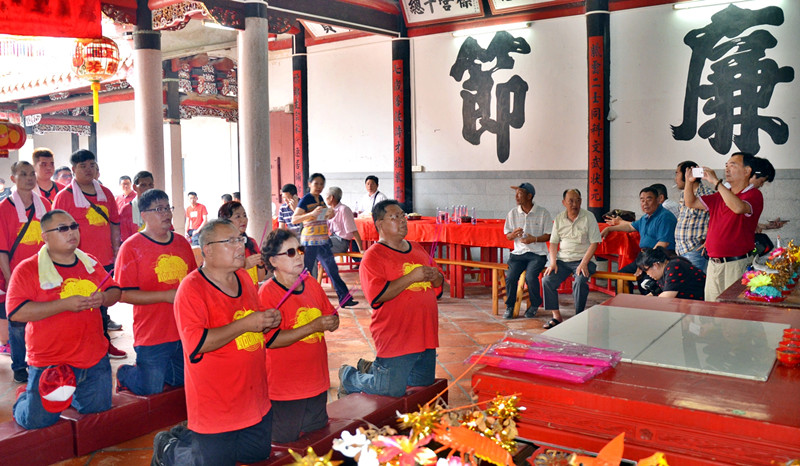Taiwan residents in quest to find mainland roots


Huang Chi-tsung (front left) and members of his extended family pray in the Huang ancestral temple in Pujin, Fujian province.
That wish weighed heavily upon Huang for many years, while a growing need to discover his origins prompted the 72-year-old to start a quest to trace his roots in the mainland, accompanied by a few items related to Pujin that were carefully stored in a plastic bag, including a map, a family tree and a newspaper story.
Family history
The name "Pujin", which was carved on his ancestors' tombstones, and the stories passed down from the time of his great-grandfather were all Huang knew about his family history.
During the Qing Dynasty (1644-1911), several groups of Pujin residents crossed the Straits and many settled in Lugang, which was a busy port on Taiwan's west coast.
They named their village Pujin in honor of their home. Initially, they worked as porters, but gradually a few started businesses, shipping commodities to the mainland.
They had good heads for business, and founded several well-known brands. Their village is a now tourist attraction featuring a number of vintage stores that display examples of their prosperous past.
One of the best-known companies was Jinyuan, which was founded by Huang's great-grandfather, the first generation of the family to live on Taiwan. The name is derived from "Jin", referring to Pujin, while "Yuan" means "origin".
"It means we come from Pujin," Huang said. "Another Jinyuan store in Quanzhou, on the mainland, was run by my great-grandfather's brother."
The practice of tracing one's family history and understanding its origins embodies the traditional Chinese virtue of filial piety, and people are taught to respect and worship their ancestors from a young age.
"When my grandfather was age 4, my great-grandfather took him to visit Pujin in the mainland. Later, the families lost contact, but grandfather often told us that we came from Pujin," Huang said.
"All his life, my father regretted that he had never visited the mainland. His health was always poor as a result of injuries he sustained during World War II (when he was forced to serve in the Japanese army), and later in a car accident. But he repeatedly told me to visit, and not to forget our roots," he added.
"My desire had to be suppressed for years because I was a civil servant on Taiwan, so I was not allowed to visit the mainland," he said. In addition, his salary was low and he had four children, so he was unable to afford the trip until he retired and his children had left home.
"As I got older, the desire to know where I came from grew stronger. I felt an urgent need to figure it out and fulfill my father's dying wish before it was too late. If I didn't, my descendants would never know about our origins."
The search begins
When his father died in 2006, Huang, the eldest son, inherited the ancestral tablet his great-grandfather had brought from the mainland.
Ancestral tablets, which usually comprise a flat piece of wood inscribed with the names of previous generations, are placed on household altars or in ancestral temples where they are worshipped.
Huang noticed six Chinese characters carved on the back of the tablet, and although no dates were given, he believed they represented the sequence of family generations.
- Scientists measure coldest ocean temperatures during 'snowball Earth' period
- China's space industry-developed eVTOL aircraft completes first flight
- Candidates for UN's AI panel include two Chinese scientists
- From ice to airwaves: Beijing Sport University shines at 2026 Winter Olympics
- 1 injured in Hong Kong truck fire
- A cultural welcome at Shanghai Pudong airport




































